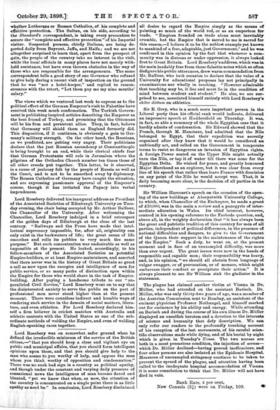Lord Rosebery was on somewhat safer ground when he defined
the irreducible minimum of the service of the British citizen,—" that you should keep a close and vigilant eye on public and municipal affairs, that you should form intelligent opinions upon them, and that you should give help to the man who seems to you worthy of help, and oppose the man whom you think worthy of opposition and condemnation." There was no such bad sign in a country as political apathy, and though under the constant and varying daily pressure of sensational news the intelligence of man became dazed and blunted, "yet we know that when, as now, the attention of the country is concentrated on a single point there is as little apathy as need be." In conclusion, Lord Rosebery disclaimed
all desire to regard the Empire simply as the means of painting so much of the world red, or as an emporium for trade. "Empires founded on trade alone must inevitably crumble, but the Empire that is sacred to me is sacred for this reason,—I believe it to be the noblest example yet known to mankind of a free, adaptable, just Government," and he was confirmed in this opinion by the fact that whenever a com- munity was in distress or under oppression, it always looked first to Great Britain. Lord Rosebery's address, which was in the main laudably free from those falsetto notes which so often disfigure his public utterances, drew warm commendation from Mr. Balfour, who took occasion to declare that the value of a University for educational purposes lay not principally in examinations nor wholly in teaching. "However admirable that teaching may be, it lies and must lie in the condition of mind between student and student." He also, we are sur- prised to see, associated himself entirely with Lord Rosebery's ()biter dictum on athletics.






































 Previous page
Previous page